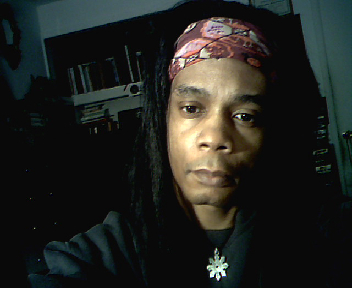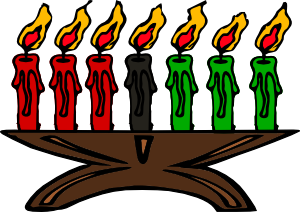


Let it be your constant method to look into the design of people's actions, and see what they would be at, as often as it is practicable; and to make this custom the more significant, practice it first upon yourself. -Marcus Garvey
Liberate the minds of men and ultimately you will liberate the bodies of men. -Marcus Garvey

Kwanzaa is a week-long African American holiday honoring African heritage, marked by participants lighting a kinara (candleholder). It is observed from December 26 to January 1 each year, primarily in the United States.
Kwanzaa consists of seven days of celebration, featuring activities such as candle-lighting and pouring of libations, and culminating in a feast and gift-giving. It was created by Ron Karenga and was first celebrated from December 26, 1966, to January 1, 1967.
Ron Karenga created Kwanzaa in 1966 as the first specifically African-American holiday. Karenga said his goal was to "...give Blacks an alternative to the existing holiday and give Blacks an opportunity to celebrate themselves and history, rather than simply imitate the practice of the dominant society."The name Kwanzaa derives from the Swahili phrase "matunda ya kwanza", meaning "first fruits". The choice of Swahili, an East African language, reflects its status as a symbol of Pan-Africanism, especially in the 1960s.
Kwanzaa is a celebration that has its roots in the black nationalist movement of the 1960s, and was established as a means to help African Americans reconnect with their African cultural and historical heritage by uniting in meditation and study of "African traditions" and "common humanist principles." The first Kwanzaa stamp was issued by the United States Postal Service on October 22, 1997, at the Natural History Museum in Los Angeles, California. In 2004 a second Kwanzaa stamp, created by artist Daniel Minter was issued which has seven figures in colorful robes symbolizing the seven principles.
During the early years of Kwanzaa, Karenga said that it was meant to be an alternative to Christmas, that "Jesus was psychotic", and that Christianity was a white religion that blacks should shun. However, as Kwanzaa gained mainstream adherents, Karenga altered his position so as not to alienate practicing Christians, then stating in the 1997 Kwanzaa: A Celebration of Family, Community, and Culture, "Kwanzaa was not created to give people an alternative to their own religion or religious holiday."
Kwanzaa celebrates what its founder called "The Seven Principles of Kwanzaa," or Nguzo Saba (originally Nguzu Saba - "The Seven Principles of Blackness"), which Karenga said "is a communitarian African philosophy" consisting of what Karenga called "the best of African thought and practice in constant exchange with the world." These seven principles comprise Kawaida, a Swahili term for tradition and reason. Each of the seven days of Kwanzaa is dedicated to one of the following principles, as follows:
* Umoja (Unity) To strive for and to maintain unity in the family, community, nation, and race.
* Kujichagulia (Self-Determination) To define ourselves, name ourselves, create for ourselves and speak for ourselves.
* Ujima (Collective Work and Responsibility) To build and maintain our community together and make our brothers' and sisters' problems our problems and to solve them together.
* Ujamaa (Cooperative Economics) To build and maintain our own stores, shops, and other businesses and to profit from them together.
* Nia (Purpose) To make our collective vocation the building and developing of our community in order to restore our people to their traditional greatness.
* Kuumba (Creativity) To do always as much as we can, in the way we can, in order to leave our community more beautiful and beneficial than we inherited it.
* Imani (Faith) To believe with all our heart in our people, our parents, our teachers, our leaders, and the righteousness and victory of our struggle.
Families celebrating Kwanzaa decorate their households with objects of art, colorful African cloth, especially the wearing of the Uwole by women, and fresh fruits that represent African idealism. It is customary to include children in Kwanzaa ceremonies and to give respect and gratitude to ancestors. Libations are shared, generally with a common chalice, "Kikombe cha Umoja" passed around to all celebrants. Non-African Americans also celebrate Kwanzaa. The holiday greeting is "joyous Kwanzaa."
A Kwanzaa ceremony may include drumming and musical selections, libations, a reading of the "African Pledge" and the Principles of Blackness, reflection on the Pan-African colors, a discussion of the African principle of the day or a chapter in African history, a candle-lighting ritual, artistic performance, and, finally, a feast (Karamu). The greeting for each day of Kwanzaa is "Habari Gani," which is Swahili for "What's the News?"
At first, observers of Kwanzaa eschewed the mixing of the holiday or its symbols, values, and practice with other holidays. They felt that doing so would violate the principle of kujichagulia (self-determination) and thus violate the integrity of the holiday, which is partially intended as a reclamation of important African values. Today, many African-American families celebrate Kwanzaa along with Christmas and New Year's. Frequently, both Christmas trees and kinaras, the traditional candle holder symbolic of African-American roots, share space in Kwanzaa celebrating households. To them, Kwanzaa is an opportunity to incorporate elements of their particular ethnic heritage into holiday observances and celebrations of Christmas.
Taken From Wikipedia, the free encyclopedia. Edited by MerlinRavenSong
Sources
Wikipedia: The free encyclopedia,
A program to raise the faith level in African-American children through Scripture, Kwanzaa principles and culture, Janette Elizabeth Chandler Kotey, DMin, Oral Roberts University,1999
The US Organization: African-American cultural nationalism in the era of Black Power, 1965 to the 1970s, Scot D. Brown, PhD, Cornell University, 1999
Rituals of race, ceremonies of culture: Kwanzaa and the making of a Black Power holiday in the United States,1966--2000, Keith Alexander Mayes, Ph.D., Princeton University, 2002
